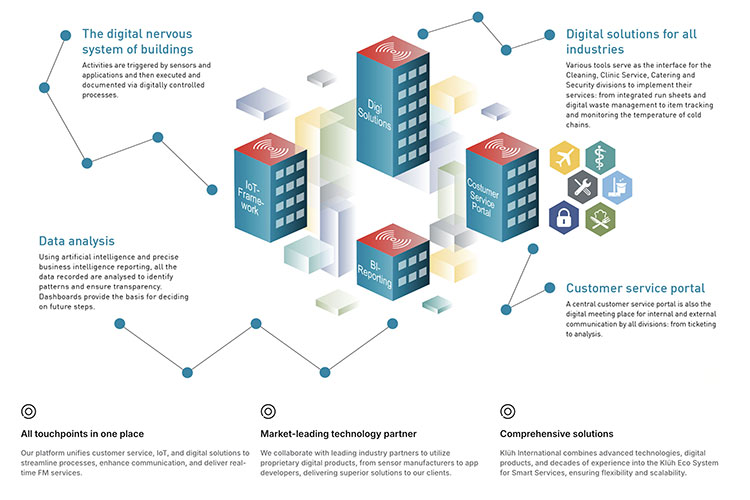

Lennart Bergmann, Head of IT and Innovation, Berkeley Services Group, throws light on the company’s innovative approach to technology, which is setting new industry standards
September 20, 2024 | Lennart Bergmann | UAE | Facilities Management

In recent years, the facilities management (FM) industry has undergone a tech revolution. Cutting-edge innovations are reshaping traditional practices, making FM more efficient, cost-effective, and sustainable. FM professionals now have powerful tools to meet the evolving demands of clients and the industry, driving unprecedented levels of performance and service.
Berkeley Services UAE LLC has always been at the forefront of the FM industry revolution, leveraging the latest technological innovations to boost cost-effectiveness, efficiency, and sustainability. As an industry leader, the company has embraced all the technological advancements to meet the evolving needs of its clients, streamline operations, and set new industry standards. It is essential to explore how these solutions have evolved, and the criteria Berkeley uses to integrate them into their services.
Computer-Aided Facilities Management (CAFM) Software
At the heart of Berkeley's technological suite is Facilio CAFM software, a comprehensive tool that has revolutionized asset management and FM operations. Facilio enables detailed tracking and maintenance of equipment, ensuring optimal performance and longevity. Automated scheduling and work order management reduce manual errors and enhance operational efficiency. With robust reporting and analytics capabilities, Facilio empowers Berkeley to make data-driven decisions, resulting in better resource allocation and reduced downtime for clients, significantly improving cost management and efficiency.
Internet of Things (IoT) Integration
Berkeley's implementation of IoT devices and technology, particularly through DigiSolutions — part of the Klüh Eco System for Smart Services — has revolutionized facilities management. Klüh International, Berkeley's parent organization, enhances their capabilities through innovative solutions. With Berkeley's use of DigiSolutions, real-time monitoring and predictive maintenance have become central to their operations. Sensors and smart meters continuously gather data on critical systems such as HVAC, lighting, and security. This constant stream of information enables proactive issue detection and resolution, optimizing energy usage and extending asset lifespan.
Berkeley’s IoT-enabled systems provide a seamless, data-driven approach to facilities management, significantly reducing unexpected breakdowns and improving service reliability. The Klüh Eco System for Smart Services offers a comprehensive suite of smart building solutions, providing both specific and general support to building operators and service providers. This 360-degree platform effectively manages floor space, services, workplaces, and sustainability, ensuring efficient and sustainable building operations.

Artificial Intelligence (AI) and Machine Learning
Berkeley leverages AI and machine learning to enhance predictive maintenance and operational efficiencies. AI-driven analytics offer deep insights into maintenance needs and operational patterns, enabling proactive decision-making. Machine learning algorithms analyze extensive data sets to predict potential issues before they become critical, ensuring minimal downtime and maximizing asset performance. This proactive approach is integral to Berkeley's commitment to delivering superior facilities management services.
Mobile Solutions
The adoption of mobile technology by Berkeley has significantly improved the agility and responsiveness of its facilities management teams. Mobile applications provide real-time access to maintenance schedules, work orders, and asset information, facilitating on-the-go management. This mobility ensures swift response to issues and efficient task management ensuring that all stakeholders are well-informed.

Cloud Computing
Berkeley’s cloud-based solutions, powered by Microsoft Azure, offer unmatched scalability, security, and remote access. These solutions ensure continuous operation and better collaboration among teams, regardless of location. Cloud computing provides robust data backup and recovery options, safeguarding critical information and ensuring business continuity. By leveraging cloud services, Berkeley can dynamically scale its operations and infrastructure to meet growing client demands.
Case Study: Enhancing Efficiency Through Digital Solutions
A notable example of Berkeley's successful technology implementation is the digital transformation of checklist management at one of Berkeley’s prestigious university projects at Al Ain. Transitioning from paper-based checklists to a cloud-based platform significantly reduced the university’s carbon footprint and paper waste by 100%. This digital shift streamlined operations, making it easier for operating professionals to manage requests and complete tasks directly from their mobile devices. Real-time updates and tracking capabilities improved task management and efficiency, aligning with the university’s sustainability goals and enhancing overall facilities management processes.
Selecting the Right Technology
Berkeley's approach to selecting the right technology involves understanding client needs, ensuring scalability, and evaluating integration capabilities. The chosen technology must be user-friendly, cost-effective, secure, and reliable. By balancing these criteria, Berkeley delivers tailored solutions that enhance operational efficiency and meet the specific requirements of each client.
Emerging Technologies in Facilities Management
Looking ahead, Berkeley is poised to embrace emerging technologies that promise to further enhance their services. The company’s CEO, Karl-Heinz Otto Mair, believes that the strategic use of technology in facilities management not only creates significant value, but also drives greater success and makes a profound impact on each client and project.
Berkeley is committed to integrating innovative solutions that leave a lasting positive effect on both the environment and the industry. Advanced IoT integration, AI, digital twins, augmented and virtual reality, energy management innovations, robotics, and enhanced building management systems are set to offer new opportunities for efficiency and sustainability. These advancements will drive the future of facilities management, setting new benchmarks for innovation and service excellence.
About the author
Lennart Bergmann, Head of IT and Innovation at Berkeley, envisions the company advancing to the forefront of technology with intelligent solutions in the field of facilities management, supporting smart and sustainable goals